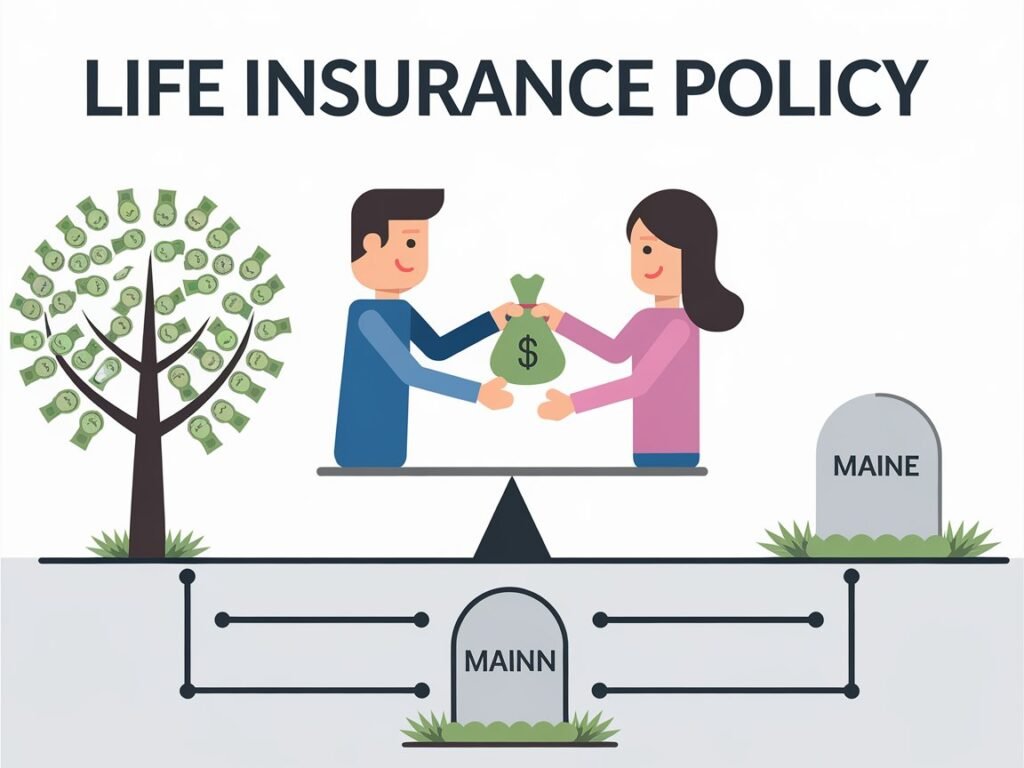Life insurance provides your beneficiaries with a lump sum payment that can be used to settle debt or replace lost income.
Life insurance originated for paying funeral expenses and providing for widows and orphans.. It has evolved into a very effective and flexible financial tool. According to the findings of the most current ownership survey conducted by LIMRA, a research group that focuses on the insurance industry [1], over half of all Americans possess life insurance.
Life insurance plans can be issued as individual or group policies.Rather from the typical group life insurance that is supplied by the company, we will be examining individual coverage.
What is life insurance?
You and a life insurance provider sign an insurance contract. In return for your premium payments, they pay your beneficiaries the death benefit under your life insurance policy.Natural and routine accidental deaths are covered by life insurance. Additionally, some policies provide “living benefits,” which entail paying a portion of the death benefit if you are diagnosed with a qualifying chronic, severe, or terminal illness.
Term life and permanent life are the two main categories of life insurance.
Permanent life could possibly cover you for your lifetime, whereas term life insurance lasts just for a specified period.
Term life insurance is usually cheaper when bought than permanent life insurance. Permanent life policies, which include whole life insurance, do not have a final date of termination unless otherwise stipulated, as long as the insured pays the premiums, but accumulate cash value over time. Read More

What does life insurance cover?
While this is the general goal for life insurance, whether the insurance payout pays for the death benefit entirely relies on how one dies. Life insurance can pay for the following depending on your type of coverage:
- natural deaths. Natural deaths can be termed, for example age, illness, heart attack, and so many more.
- accidents and death. Car accidents, drowning, and falls are just a few examples of accidents. There are even some policies that have riders which increase the payout upon an accident death benefit.
- suicide. Suicides usually are part of life insurance, but again, this is following a waiting period, typically the first two years of the policy.
- murder. Murders are often covered under life insurance, but of course, what gets paid out depends on what went down. For instance, if the beneficiary killed the insured, they wouldn’t get the death benefit. Innovative Insurance a Complete Guide
disease or wounds. Certain insurance provides coverage for injuries or illnesses sustained while you’re still alive. For instance, a critical illness rider covers illnesses like cancer and ailments that prevent you from engaging in your regular activities for the rest of your life. If you are given a terminal diagnosis, you can collect your death benefit through an accelerated death benefit rider.
Terrorism or war. Certain life insurance policies might not cover deaths brought on by terrorism or conflict.
What does life insurance not cover?
illegal activities. As a rule of thumb, if you are found dead while doing something that is considered illegal, your beneficiaries will not receive the death benefit. This includes alcohol and drug abuse. For instance, the policy usually does not pay in case you die from drunk driving. That is illegal.
dangerous recreations. Certain life insurance policies are not in effect if you die participating in a dangerous recreation, such as skydiving.
Lastly, fraud. The insurance company can cancel your life insurance policy if you lie on your application. When you apply for coverage, be as truthful and open as you can be.
How does a life insurance policy operate?
Life insurance covers the lives of insured persons. A policyholder, which can either be an individual or organization other than the insured, pays premia to the insurance company. The policy showing the named beneficiaries receives a sum of money as compensation from the insurer.
You can buy a term life insurance policy that will pay for you for 10, 20, or even 30 years. The policy pays the face amount if you die during that period. Nobody gets paid if you do not die during that period.

Term life insurance is in high demand due to its relatively cheaper cost compared to permanent life and higher pay-out. Additionally, it provides protection for a specified number of years.
There are a few varieties of term life insurance. A convertible policy, for example, can be converted to permanent life insurance sometime in the future for a greater premium and possibly more flexible long-term insurance. Decreasing term life insurance policies, like mortgage protection insurance, have a death benefit that decreases each year and are often tied to massive debts that slowly get paid off.
What is covered by term life insurance?
Here is the best reason you might need term life insurance:
- You simply want to be sure your child has enough savings in place to pay for college if you die.
- Sizeable debt, such as a mortgage that you would hate your spouse to inherit after you leave this world, is the main reason you want life insurance.
- If you die while working and providing for a family, you want to replace your income.
- You want to protect your interest in a business; term life insurance can fund agreements to buy or sell a business, or it can cover key individuals.
The operation of perpetual life insurance
For the most part, permanent insurance is good until you die provided you continue paying premiums. The most common form of permanent insurance is whole life, although other forms exist, including variable, indexed, and universal life. How do You get Life Insurance
The value of permanent life insurance plans increases over the policyholder’s lifetime. The cash value is increased by part of the premium payments, and it may also increase with interest.
The cash value of whole life insurance tends to rise steadily, whereas the cash value of universal life insurance plans appears to fluctuate. For More Information visit the Site



